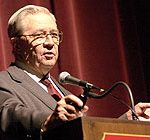Dr. Donald Henderson, director of the Office of Public Health Preparedness, discussed the fight against smallpox and biological weapons during a March 20 speech in McCrary Theatre. Details...
 Henderson, whose office is part of the U.S. Department of Health and Human Services, is responsible for coordinating the United States’ national response to public health emergencies. He assumed his post less than two months after the Sept. 11 terrorist attacks.
Henderson, whose office is part of the U.S. Department of Health and Human Services, is responsible for coordinating the United States’ national response to public health emergencies. He assumed his post less than two months after the Sept. 11 terrorist attacks.
“There is a concern on the part of all of us, because we’ve seen one anthrax release, and the question is where will the next one take place,” Henderson said. Besides anthrax, Henderson said plague, smallpox and hemorrhagic fevers, such as ebola, are the biological weapons of choice for terrorists, because they are easily spread.
Only recently has the U.S. government started to commit the resources necessary to fighting biological terror, Henderson said. “Not until 1999 was the Department of Health and Human Services budgeting more than $2 million to fight biological weapons.” That year, the Clinton administration recommended $173 million be allocated to guard against biological terror.
Henderson was a leader in the fight against smallpox, a disease estimated to have killed more than 300 million people in the 20th century alone. He directed the World Health Organization’s (WHO) global smallpox eradication campaign from 1966-1977. The last recorded case of smallpox by natural infection was in 1977, and the WHO declared smallpox eradicated in 1980. Henderson also founded the WHO Expanded Program on Immunization, which provides six vaccines to children throughout the world.
He received the National Medal of Science from President Reagan in 1986, and is also the recipient of the National Academy of Sciences Public Welfare Medal. Henderson served as the director of the Johns Hopkins Center for Civilian Biodefense Studies from 1998-2001. He is on leave as a Johns Hopkins Distinguished Service Professor.
Henderson’s speech was part of the Voices of Discovery Science Speaker Series, sponsored by the departments of Science and Mathematics.


